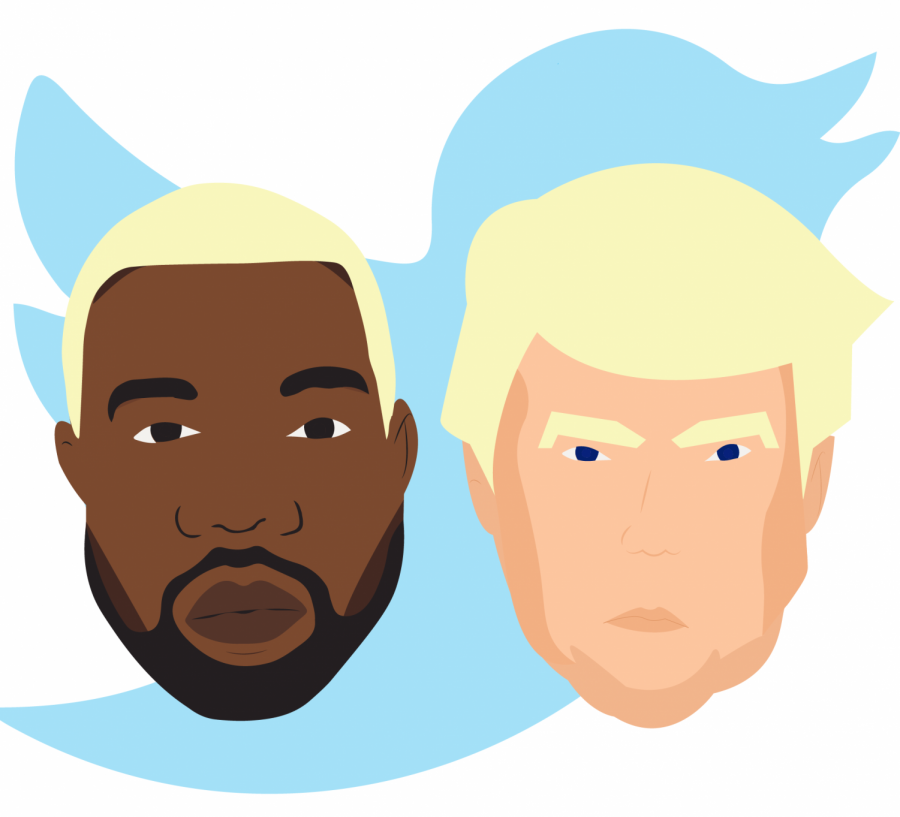Kanye West tests the bounds of free thinking
April 30, 2018
Freedom of speech, religion, expression and thought have all come into the spotlight in the last few years, particularly on college campuses like our own University. The debate as to what should or should not be the limits of true “freedom” has been omnipresent, and it perhaps does not have any definitive answers.
During the past week, a new, but perhaps unintended, player in that game appeared. That individual is Kanye West. His ensemble of tweets championing “free thinking” and “love” have raised eyebrows from his fanbase and have drawn the praise of the conservative Twitter sphere. From sharing his love for Candice Owens to announcing his shared “dragon energy” with the president, this is all in the name of love, of course.
Traditional debate about freedoms comes when two conflicting sides spar with one another, usually at a speaker’s event or protest, about what is particularly being said. West poses a different aspect of the debate: whether free thought is inherently good.
A few of West’s fellow musical artists and media personalities have reached out or made subtle statements questioning his thought process regarding the platform he has and how best he should use it. For the general public, there’s the attitude that perhaps Kanye is abandoning the beliefs that drove his music and actions since the early 2000s, and that he’s doing an active disservice to his fans who admire him for that persona. Also, the public believes he is consenting to the unpopular and harmful actions, both domestically and abroad, of the president. This brings up the discussion of whether he is right in his “free thinking.”
While it certainly isn’t a negative characteristic to embrace individuals of different thoughts and world perceptions, that doesn’t make it inherently beneficial to society. Repeating phrases such as “everyone has their own opinion” and then justifying them in the name of “spreading love” is rather naive. The idea that everything is subjective, and therefore that there can be no wrong thoughts, is one of the worst philosophical arguments made across the board. This goes for every part of the spectrum, from societal culture to political ideology.
Get The Daily Illini in your inbox!
The notion of “free thinking” shouldn’t be treated as a means to justify your own world views, but rather to challenge the views that face real oppression or are being silenced. Free thinkers are Martin Luther, who questioned the Catholic church’s antics during days of selling indulgences, and John Locke, who gave birth to liberalism with the principle that people have inherent rights that cannot be taken away by the state. Also, John Stuart Mill, who championed the idea that society should strive for the best outcomes to maximize happiness.
It’s the outcomes that hold the value of a given thought and stand the test of time. Should we tacitly consent to “free thinkers” perpetuating ideas if they are detrimental to society? If Kanye West considers Donald Trump to be a “free thinker,” then perhaps the basis for what is deemed “free thinking” should be reevaluated.
To show the extreme of this, history reveals to us in Germany, the Soviet Union and Rwanda that thoughts can ferment into actions in which people universally agree to produce bad outcomes such as war, hunger and genocide. It would be foolish and self-defeating for humanity to revive ideas like those without scrutiny from society in the name of “free thinking.”
This is not to advocate for state suppression or moderation of thought, for that would be an even greater ill. But Kanye West and his fellow “free thinkers” should understand when presenting an idea that may be unpopular or harmful, they are not immediately justified solely because they are entitled to their own opinion. They should expect to be contested and have their ideas put to trial by the people, to which the outcomes of those thoughts determine whether they should be believed in. That is what true free thinkers encourage.
Austin is a sophomore in LAS.







